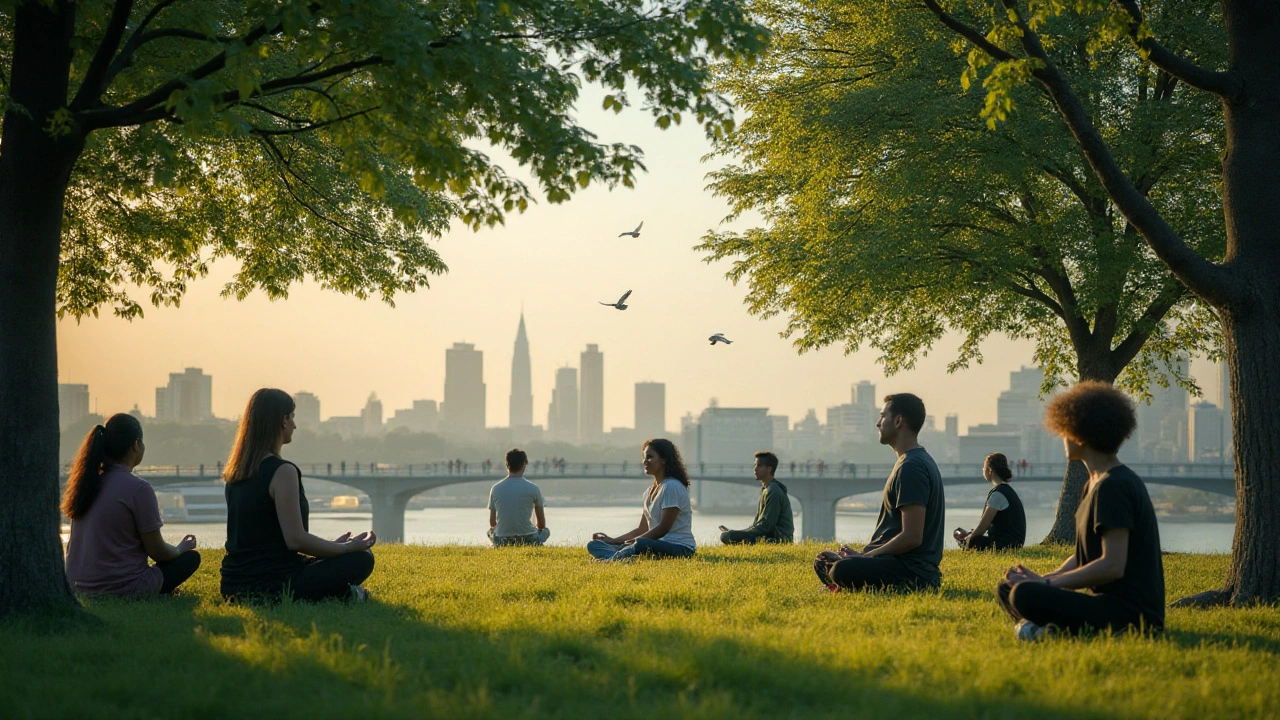Life today races at a pace faster than ever before. As technology advances, our lives have become a whirlwind of constant updates and digital chatter seeking our attention. Remember the time when solitude felt like a common part of the day?
In today's world, finding moments of calm is vital not only for relaxation but for maintaining a sound mind. A calm environment and mindset nurture better decisions, enhance mental clarity, and bolster emotional resilience. They help us connect with others and navigate daily challenges with patience and grace.
Amidst this frenetic rush, it's crucial to identify ways to invite calmness back into our lives. Whether through a morning practice of gentle stretching, tuning into nature during a short walk, or setting aside time for mindful breathing, incorporating such habits can make a significant difference. It isn't about escaping the world's demands but rather engaging with them more wisely and peacefully.
- Why Calmness Is Crucial Now
- The Impact of Stress on Daily Life
- Calmness and Mental Health
- Small Steps to Create Calm
- Mindful Practices to Incorporate
- Benefits of a Calmer Lifestyle
Why Calmness Is Crucial Now
It's no secret that our modern world is a hive of activity, buzzing with persistent energy that can often become overwhelming. This relentless pace doesn't just exhaust our bodies; it clutters our minds too, setting the stage for stress to flourish. The importance of calmness cannot be understated in these conditions. We're not just wired for constant interaction, but rather for intervals of peace that allow us to recharge and reflect. Calmness offers sanctuary amidst chaos, inviting us to embrace a quieter presence, one that is responsive rather than reactive. Quiet moments aren't just nice to have; they are essential for mental survival.
Consider the effect of continuous multitasking, which is glorified today as a skill. Scientists have linked it to decreased productivity and higher stress levels. Our brains crave moments of singular focus, listing them as vitals for creativity and problem-solving. Imagine your mind as a factory line working efficiently until a chaotic overload causes it to falter. Gone are the days when the primary interruption was the phone ringing. Today, we juggle endless streams of emails, texts, and notifications. Amidst this, calmness works as a filtering system, helping us make sense of the noise, allowing clarity and direction to emerge.
Research published by the American Psychological Association reveals a significant correlation between excessive media consumption and heightened anxiety, which outlines a narrative for why calm is so critical today. A calm state not only mitigates stress but also aids in maintaining heart rate and blood pressure, linking direct health benefits. Engaging with daily demands while remaining rooted in a calm state helps balance life's equation, ensuring productivity does not come at the cost of well-being. As Anne Lamott wisely writes,
'Almost everything will work again if you unplug it for a few minutes, including you.'
The benefits of a calmer lifestyle reach beyond the individual. In family settings, it's the calm who keep the home anchored. In workplaces, the calm are innovators fostering collaboration without undue pressure. Beyond personal circles, calm shapes societal interactions, promoting patience and dialogue over conflict. The urgency for calmness is woven into the fabric of daily life, asking each of us to step back and gain better perspective. In the rhythm of our daily grind, let us learn to breathe, to pause, to respect and acknowledge a space that is oftentimes undervalued and underutilized: the enriching space of calm.
The Impact of Stress on Daily Life
Stress is a frequent companion in the daily lives of many people around the globe. It seems that practically everyone you talk to has their own tale of racing deadlines, mounting responsibilities, and a sense of constant pressure. This unrelenting stress doesn’t just affect the mind; it takes a toll on the body as well. Long-term stress can lead to a host of health issues, some more visible than others. For instance, it's well-known that stress can contribute to heart disease and high blood pressure. In addition, there are lesser-known effects, such as making the skin more prone to acne or exacerbating conditions like eczema.
Stress also creeps into our relationships, often unnoticed until it becomes a significant issue. When one is under stress, the capacity to empathize and communicate effectively dwindles. This often leads to misunderstandings, conflicts, or even withdrawal from social settings. It's worth considering how our interpretation of minor irritants is exaggerated under stress. A task that might normally take a few moments can feel insurmountable when piled onto an already stressed mind. This often results in procrastination and mental fatigue, which only amplifies the feeling of stress, creating a vicious cycle.
Notably, chronic stress can severely impact **mental health**. It is a significant risk factor for developing anxiety and depression. When the brain is under constant strain, its ability to regulate emotions efficiently decreases, leading to mood swings. Moreover, stress affects concentration and memory, which are critical functions for carrying out the simplest of tasks. This means stress can indirectly lower productivity levels at work, school, or in personal pursuits, leading to a sense of failure or inadequacy.
According to the American Psychological Association, stress-related ailments lead businesses to lose up to 300 billion dollars annually due to absenteeism, turnover, diminished productivity, and medical expenses. This staggering figure highlights the extent to which stress permeates every layer of society, from individual well-being to economic prosperity.
The Dalai Lama once said, 'Calm mind brings inner strength and self-confidence, so that’s very important for good health.' His words underscore a crucial understanding – that managing stress not only benefits individual health but enriches society as a whole.
In everyday life, it’s often small, practical interventions that can help mitigate **stress**. Techniques such as breaking tasks into smaller, more manageable steps or setting specific time slots for work and rest can significantly reduce stress. In the long run, consistently integrating calming practices can foster an environment where individuals feel more balanced and in control. People might consider mindfulness exercises like meditation or yoga, known for their ability to lower stress levels and enhance mental clarity. By embracing these strategies, we can begin to loosen the chaotic grip of stress on our daily lives and cultivate a greater sense of calm and well-being.

Calmness and Mental Health
In a world that often feels like it’s spinning out of control, maintaining a sense of calm can seem elusive. Yet, calmness is one of the most potent tools in safeguarding our mental health amid the chaos. When the mind is constantly bombarded with the demands and stresses of daily life, it struggles to find peace. Without moments of respite, anxiety and stress levels can easily skyrocket, impacting both our mental and physical health. Calmness acts as a counterbalance, helping to reduce the cortisol, the stress hormone, levels in our bodies, and allows us the space to breathe, think, and repair.
Modern studies have shown that practicing calmness through activities like meditation, deep breathing, and yoga can significantly improve mental health and well-being. These practices have been linked to lower levels of anxiety, depression, and stress, thanks to their ability to promote a state of mental and emotional clarity. Mindfulness-based therapies have become an integral part of how mental health professionals address conditions such as post-traumatic stress disorder (PTSD) and chronic anxiety. When individuals engage in calmness-inducing practices, they report better sleep, enhanced focus, and an improved ability to manage challenging emotions.
According to the National Institute of Mental Health, routine stress management can decrease the risk of more serious mental health issues developing over time. Because stress can exacerbate existing mental health challenges, incorporating practices that promote calmness is more important than ever. Taking time each day to cultivate stillness isn’t just a way to escape; it’s a method of building resilience and nurturing a healthier state of mind. With a clearer mind, individuals are better prepared to navigate the complexities of life and handle unexpected events with grace.
"The greatest weapon against stress is our ability to choose one thought over another." – William JamesIn these wise words, we find a reminder of the power of choice within us. We can't always control what happens around us, but we can control how we react. Adopting calmness encourages us to respond rather than react, making thoughtful choices instead of impulsive decisions. This shift not only benefits mental health but also improves interpersonal relationships and professional interactions.
A deeper look at stress reveals its role in many common health problems, so maintaining balance through calmness becomes not just a matter of thriving but of surviving well. Obstacles, once stressful, are approached with a renewed mindset. The importance of infusing calmness into our daily routine cannot be overstated; it's essential for maintaining not just mental health but a balanced and fulfilling life. As we commit to these practices, we advance toward a life where calmness becomes a natural state, enhancing our capacity to enjoy both triumphs and tribulations.
Small Steps to Create Calm
In a world that's always buzzing, finding a slice of calm can sometimes feel like searching for a needle in a haystack. Yet, it's often the simplest things that wield the most power to transform our chaotic routines into harmonious ones. Start by setting a morning routine that prioritizes calmness. Before the day kicks into full gear, take a few minutes just for yourself. This can be as simple as enjoying your morning coffee in silence or engaging in a short meditation session. Creating these peaceful moments at the beginning of the day can set a positive tone and help manage stress more effectively.
People frequently underestimate the significance of their breathing patterns in managing stress. Dr. Andrew Weil, a renowned expert in integrative medicine, once noted, "Practicing conscious breathing is one of the most powerful tools to decrease stress and promote tranquility around us." A few deep breaths can shift our entire mindset, bringing the mind to a steady pace. Another easy, yet impactful, practice is spending time in nature. Surrounding yourself with greenery or simply soaking in natural light can do wonders for your mental state. Taking a walk in the park or sitting under a tree with a book can melt away stress and anchor you back to the present moment.
An often overlooked yet fascinating fact is that our environment intricately influences our mood. A cluttered space can oddly mirror a cluttered mind. So, take some time to organize your surroundings. Keep your living and working spaces clean and tidy. A little order in your physical space can foster a sense of calm in your mind. The colors in your environment can also play a role. Soft blues and greens often evoke a serene atmosphere, whereas reds and oranges can sometimes induce excitement or restlessness.
Meditation has been known for ages as a tool for maintaining a balanced mental state. But meditation doesn't have to be sitting cross-legged in silence for hours. It can be as simple as focusing on your breathing for a minute or two whenever you feel tense. Try these small doses of mindfulness throughout the day, like while washing your hands or before meals, to recenter your thoughts and bring calmness into your routine.
Another effective strategy is to practice gratitude regularly. It might sound achingly simple, but acknowledging at least one positive aspect of your day can shift your perspective significantly. This practice unwraps the gift of appreciation and shifts the focus from what could go wrong to what is going right. Even jotting down three things you're thankful for every night can enhance positivity and draw you closer to tranquility. Remember, creating calm doesn't require drastic changes but rather simple, thoughtful actions with significant impacts.

Mindful Practices to Incorporate
Incorporating mindful practices into your daily routine may feel like a big change, but these small steps can have a huge impact on your overall calmness and well-being. Let's start with a practice that involves our oldest and most trusted friend: the breath. Deep, intentional breathing exercises can be done anywhere, anytime. When you feel overwhelmed, pause for a moment and inhale deeply through your nose, filling your lungs completely. Hold the breath briefly, then exhale slowly through your mouth. This not only calms the nervous system but also centers your mind in the present moment, which is the essence of mindful living.
Another practice is to cultivate an attitude of gratitude. In our modern society, it is easy to focus on what we lack rather than what we have. Try ending each day with a simple gratitude exercise. Reflect on three things you are thankful for, no matter how big or small. Writing them down can solidify these thoughts and create a physical reminder of the abundance in your life. Over time, this practice shifts your focus from stress-inducing thoughts to positive perceptions.
Adding meditation to your routine, even for just five minutes, can significantly enhance your mental health. Many people feel a barrier to starting meditation, thinking it requires clearing the mind of thoughts, but it’s really about observing them without judgment. There are countless guided meditation apps available today which can be a helpful starting point for beginners. You can focus on your breath, a mantra, or even a piece of music. The goal is not to stop thinking but to learn to sit with your thoughts, acknowledging them without action.
"Mindfulness is a way of befriending ourselves and our experience." — Jon Kabat-Zinn
Mindful eating is another practice that enhances calmness. In our busy routines, meals are often rushed affairs, pastry in hand while juggling tasks, and rarely enjoyed. Try sitting down with your meal, savoring each bite, and truly tasting your food. Notice the colors, the aromas, and the textures. This simple act can transform your relationship with food, leading to healthier eating habits and greater appreciation for nourishment.
Finally, consider incorporating a mindful walk into your day. This doesn’t have to be a hike or an intense workout. Instead, find a comfortable pace and environment, such as a park or a quiet neighborhood street. As you walk, focus on the sensation of your feet touching the ground, the rhythm of your walk, and the sounds around you. Let your senses guide you and immerse yourself in the experience.
These practices may seem small, but they accumulate into a profound sense of peace and presence over time. They aren't about shutting out the world but rather engaging with it more fully, paying attention to life's finer details. In this ongoing journey towards a calmer lifestyle, consistent effort, patience, and a willingness to learn from each moment are your best guides.
Benefits of a Calmer Lifestyle
Imagine waking up every day feeling refreshed, unflustered by the usual morning rush. A calmer lifestyle isn't just about slowing down—it's about enhancing your quality of life in numerous ways. Studies suggest that maintaining a centered state of mind can significantly reduce stress, which in turn leads to a stronger immune system. This means fewer sick days and more energy to engage in activities you love. By prioritizing calmness, you set the stage for a bodily environment that thrives on balance and wellness.
Having a calm approach tends to improve mental health by reducing anxiety and depression levels. When you calm your mind, you open doors to better problem-solving skills. Your mind isn't racing to find solutions, but rather, it allows creativity and logical thinking to come through naturally. Imagine the ease of approaching life's challenges with a renewed perspective. This sense of clarity can bring about greater efficiency in both personal and professional arenas, leading to increased opportunities for growth and success. Quite simply, when the mind is at rest, the possibilities are endless.
Perhaps you find another unexpected advantage in enhancing relationships. Bringing calmness into your daily encounters can deepen your connections with others. When you approach interactions with patience and understanding, your relationships are likely to flourish. People are drawn to the tranquility that emanates from someone who approaches life with steadiness. This receptive demeanor fosters open communication and reduced conflict, resulting in more meaningful and enriching relationships.
"The ability to simplify means to eliminate the unnecessary so that the necessary may speak," said Hans Hofmann, highlighting how calmness can help us focus on what truly matters.
Calmness can even positively impact our physical surroundings. A serene mind sees beauty in the simple, affording appreciation for nature's details—a gentle breeze, a warm sunbeam, or a calm ocean wave. When you cultivate calmness, you're more inclined to practice gratitude, acknowledging the blessings in everyday life that often go unnoticed due to the rush and noise.
Furthermore, individuals who lead a calm lifestyle often find they are more successful in reaching goals. When distractions are minimized and the mind is at ease, one can concentrate fully on steps toward achieving objectives. Whether pursuing a project at work or a personal aspiration, maintaining composure is the key.
But how do we achieve this change of pace? It starts with small, consistent efforts. Begin by setting boundaries on daily interactions or screen time. Take deep breaths when overwhelmed. These tiny shifts, though seemingly insignificant at first, can accumulate and bring about profound changes. It isn’t about flipping a switch but rather nurturing a mindset shift that incorporates tranquility into your daily rhythm. This way, you create a foundation for a healthier, more fulfilling life.







